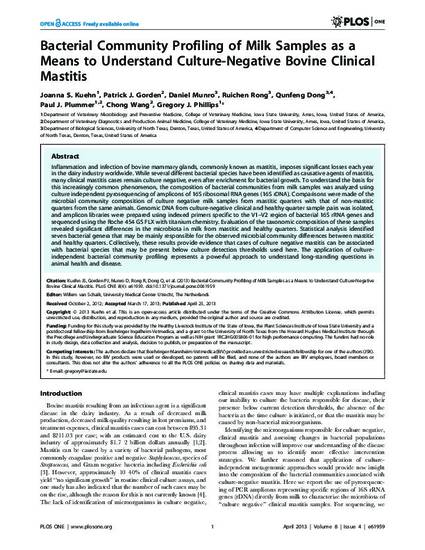
Inflammation and infection of bovine mammary glands, commonly known as mastitis, imposes significant losses each year in the dairy industry worldwide. While several different bacterial species have been identified as causative agents of mastitis, many clinical mastitis cases remain culture negative, even after enrichment for bacterial growth. To understand the basis for this increasingly common phenomenon, the composition of bacterial communities from milk samples was analyzed using culture independent pyrosequencing of amplicons of 16S ribosomal RNA genes (16S rDNA). Comparisons were made of the microbial community composition of culture negative milk samples from mastitic quarters with that of non-mastitic quarters from the same animals. Genomic DNA from culture-negative clinical and healthy quarter sample pairs was isolated, and amplicon libraries were prepared using indexed primers specific to the V1–V2 region of bacterial 16S rRNA genes and sequenced using the Roche 454 GS FLX with titanium chemistry. Evaluation of the taxonomic composition of these samples revealed significant differences in the microbiota in milk from mastitic and healthy quarters. Statistical analysis identified seven bacterial genera that may be mainly responsible for the observed microbial community differences between mastitic and healthy quarters. Collectively, these results provide evidence that cases of culture negative mastitis can be associated with bacterial species that may be present below culture detection thresholds used here. The application of culture-independent bacterial community profiling represents a powerful approach to understand long-standing questions in animal health and disease.
Available at: http://works.bepress.com/paul-plummer/20/

This article is from PLOS ONE 8 (2013); e61959, doi: 10.1371/journal.pone.0061959. Posted with permission.